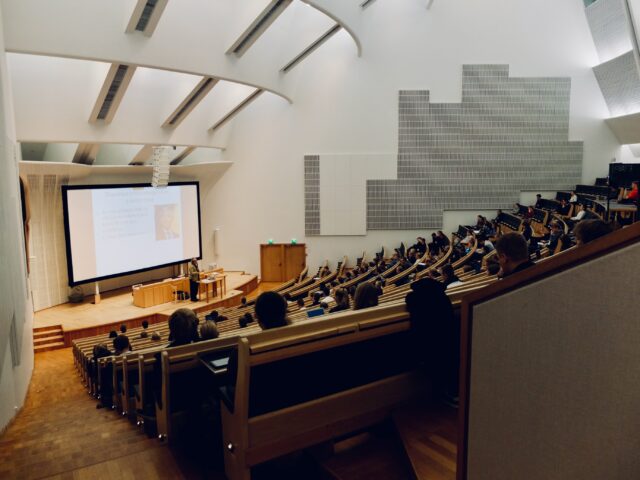The British Columbia Institute of Technology has received over $14.5M from the provincial and federal governments to support aerospace and life sciences training. BCIT will use the funds to establish new training programs, such as a hands-on program for gas turbine maintenance, repair, and overhaul that is reportedly the first of its kind in North America. BCIT has also received over $7M to create the National Biomanufacturing Training Centre. The training centre will offer training, professional development, and highly-skilled graduates to meet the needs of biotech companies.

Top Ten News
February 16, 2023
The Weston Foundation has awarded $10M in new funding to support soil health projects across Canada. The funding will go toward a variety of projects—including projects involving Assiniboine Community College, Dalhousie University, Olds College, the University of Guelph, and the University of Saskatchewan—that seek to share knowledge, build networks, and provide farmers with the tools they need to improve their soil health. These include an ACC-led Net Positive Network for Western Canada, the Dal-led development of digital soil mapping tools, and USask’s establishment of Indigenous Soil Health Learning Circles. “Soil is foundational to long-term viable agriculture and food production, and healthy soil can help mitigate climate change,” said ACC Dean of the Russ Edwards School of Agriculture and Environment Tim Hore.
Canadian Nuclear Laboratories and Atomic Energy of Canada Limited have signed MOUs with the University of Waterloo and Western University to advance collaborative research opportunities in the nuclear sector. The partners will share their resources and knowledge with one another and with university researchers benefitting from access to advanced nuclear facilities such as AECL’s Chalk River Laboratories. “This collaboration will fuel innovation and advance training in key areas, including additive manufacturing, clean energy, and security, areas that are important for Canada’s future,” said UWaterloo VP Research and International Dr Charmaine B Dean.
Thompson Rivers University VP of Finance and Administration Matt Milovick has reportedly launched a notice of civil claim against eight former and current TRU employees alleging malicious defamation. Castanet reports that TRU launched an investigation into allegations against Milovick and Larry Phillips in 2021, after which Milovick was cleared of all 22 allegations of misconduct. Kamloops This Week states that Milovick is now seeking damages from the defendants and a permanent injunction against the publication of defamatory statements. The eight defendants have launched a fundraiser to help cover the legal bills associated with the lawsuit. “We participated in the investigation in good faith, and in the hopes of creating a better university,” said former TRU human resources director Amanda Ellison. “We deny all of the allegations in this suit.”
In a recent interview with The EvoLLLution, Sherri Braxton discusses the strategies that postsecondary institutions can use to enter the world of digital badges. Digital badges are a newer way of providing learners with educational upgrades, and Braxton explains that institutions will need to educate employers on this kind of credentialling and demonstrate how student skills are transferrable to other environments. Braxton recommends starting with a pilot program in an area with clear demand to demonstrate the value of a new credential; engaging faculty and institutional representatives to facilitate buy-in; and encouraging institutions to incorporate employer language in program frameworks.
The University of Ottawa has received over $34.7M for five French-language resources and programs from the provincial and federal governments. $22M will be used to improve, expand, and develop new French bachelor’s degrees in STEM; hire 20 French-speaking professors over two years; and convert programs to French. UOttawa will also use the funds to address the shortage of French-speaking teachers, offer additional technological education for French-speaking teachers, create a centre of excellence for French-language, and develop laboratory facilities for French-language health sciences programs at the university.
Cégep de Rivière-du-Loup has unveiled its new pharmacy techniques labs after an over $2.2M upgrade project that involved major renovations and new equipment purchases. The renewed facilities are equipped with a variety of state-of-the-art software and devices including a robot for automatically counting tablets and capsules, a drug packing and distribution machine, and an automated cabinet for managing drugs. Cégep directeur général René Gingras said that the upgrades are essential for training pharmacy professionals and will give them the opportunity to use job-relevant software and equipment before completing their studies. Rivière-du-Loup
Saskatchewan Polytechnic will be receiving $1M over ten years from Orano Canada to support and expand the polytechnic’s Women in Trades and Technology (WITT) program. WITT will use the funding to expand its mentorship programming, workshops, and training sessions and create additional training opportunities in rural and northern communities. The funding will also be used for an annual scholarship for a woman studying in one of Sask Polytechnic’s trades or technical programs. “Our goal is to inspire and encourage the next generation of women and girls to consider trades careers, overcome limitation barriers and ultimately bridge the employment gap between men and women in these sectors,” said Sask Polytech President Dr Larry Rosia.
In a recent article for The Conversation, Terri L Griffith of Simon Fraser University discusses how AI tools such as ChatGPT have become an expected part of her technological innovation course. Griffith argues that “5T thinking”–which considers a set target and the times, talent, technology, and technique needed to achieve it–can be used systematically by professionals to ensure that they stay current with tools and workflows. The author writes that while students must learn how to use existing innovations, instructors must also keep their syllabus up to date and ensure that students understand the expectations for assignments. “Guidelines in work and education need to keep pace and be thoughtfully aligned to how knowledge is constructed in different fields,” writes Griffith.
Durham College has successfully reached its $10M Building for Skills Campaign goal. The campaign raised funds to increase the training capacity on the Whitby campus and transform Durham’s delivery of professional and skilled trades training and education in order to prepare graduates for careers that address Canada’s skilled trades talent gap. “Thanks to the incredible generosity and support of our Durham College donor community, we have fully funded – and opened – the state-of-the-art Ontario Power Generation Centre for Skilled Trades and Technology,” said Durham AVP, Development and Alumni Affairs Linda Flynn.
